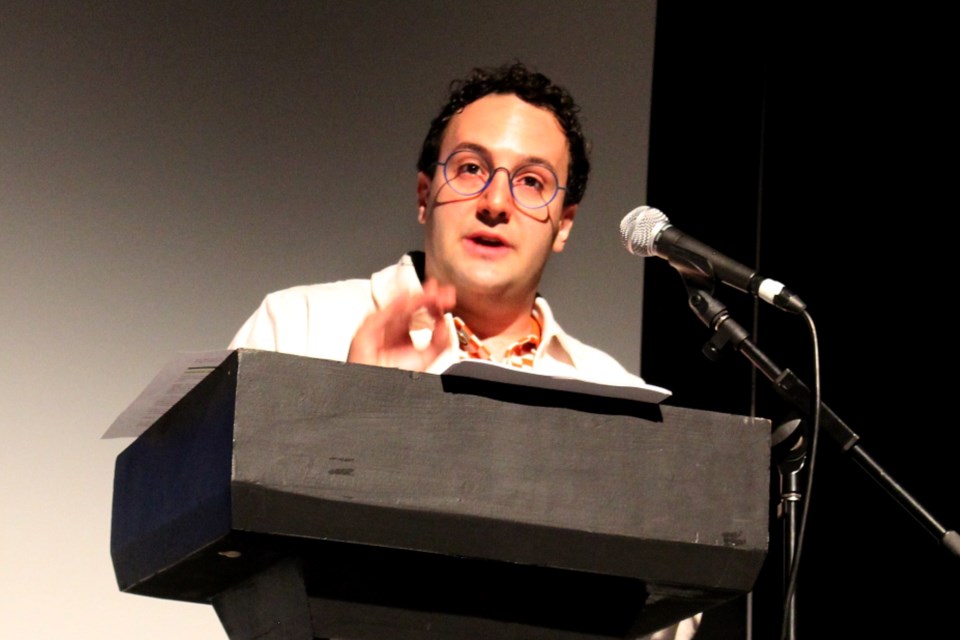The ecstasy of the stage is one that few can deny, the feeling of joy and fulfillment that comes from expressing a character, and even yourself, in front of an audience.
But of course, what comes up must always come down, and those first few moments after the curtains close can be difficult.
It was for Alessandro Costantini.
The actor of both stage and screen said that he felt absolutely gutted after his first stage appearance.
“I was quite devastated,” Costantini said. “I remember coming home and taking all the cards and all the little gifts I received from family or friends who came to see the show or any cast members. I spread everything out on my bed. And I stared at it and cried.”
Costantini said he told his mother he’d never do it again. Well, that sentiment didn’t take.
Now artistic director of the company he created, YES Theatre, as well as Sudbury Theatre Centre, Costantini said he is focused on offering those same opportunities, both the lows that require resilience, but also, the true power of the stage.
It’s what he calls the “sunrises and sunsets” of the theatre.
There are the moments of glory, like seeing more than 60 members of your friends and family who drove several hours to see you in the Toronto production of the Tony-award-winning Broadway show Dear Evan Hansen.
There are also the moments that hurt.
“When we closed in Toronto, we closed early, and that was a really devastating thing,” Costantini said.
He said he was fortunate to get the national tour offer from that point – another sunrise after the sunset– and that only increased both his enjoyment and understanding of the industry.
“I learned so much both as a producer and as an actor,” Costantini said. “I learned a lot about commercial theatre, and I'm grateful for the entire scope of what that experience gave me. It was a journey and such a huge part of my life.”
That learning will help with his new endeavour; one that has not been without struggle. Costantini began YES Theatre as a young person, and now, with a merger between that company and the Sudbury Theatre Centre (STC) in the works, there are new challenges on the horizon, some of which are controversial with the theatre community.
Although they are still legally two separate entities — at least for now — YES Theatre and STC will work together with combined resources and staffing to put on a joint 2022-2023 pilot season, including the potential for three mainstage plays, eight mainstage musicals, three or more concerts and three new works.
A presentation during a May 25 press conference espouses a vision for a “Stratford North,” including STC’s building and YES Theatre’s new Refettorio (outdoor theatre), which is to be built on Durham Street.
As YES Theatre’s artistic and managing director, who’s also now the interim artistic director with STC, Costantini said at the time “this has not and will not be an easy road.”
“Change imposes many hurdles, and we may not have all the answers to all the questions just yet,” Costantini said. “Every single person involved in this course these last weeks and months shares a common belief and that is that the theatre is sacred and important, and what we presented today is the beginning of a beautiful and renewed future.”
And now, after gaining a better understanding of not just the stage, but behind the scenes as well, Costantini is hoping to offer an accessible experience for actors and theatre goers alike.
“I really love working with folks who are still learning, and I think what I try to do as a director is encourage them to pull as much of themselves in to it as possible, so that the way that we develop the production or the process of developing their character really stems from, from themselves and things that are accessible in their lives,” Costantini said.
He said the ability to make small connections, built from the varied nuances and complexities of each person, is what will make theatre truly accessible.
“Being a theatre artist is a very deeply human experience; I think the more that we can encourage, the more that I can create any process or ecology or community that celebrates people, that celebrates the act of coming together, lays a strong foundation for us to do work.”
And it’s these little moments, the ability to make small connections within himself and with others, as well as the resilience to the sunsets of the theatre that make an actor successful, Costantini said.
“It's easy to think of success as full houses or accolades, the reception you get,” Costantini said.
“But I made the decision, or the realization, that success is working with people you love on projects you love. If all those things come together, if the process is meaningful, if I create lasting relationships with the people, that is how I define success. By measuring how meaningful the human experience is.”
Jenny Lamothe is a reporter with Sudbury.com.



